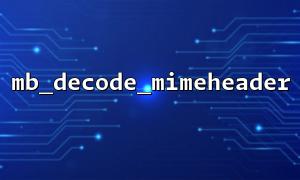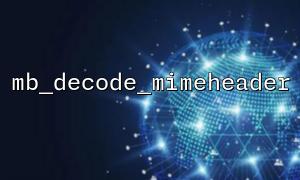mb_decode_mimeheader() is a very useful function provided by PHP for parsing MIME-encoded strings (such as "=?UTF-8?B?...?=" or "=?ISO-8859-1?Q?...?=") in email headers, commonly used for decoding non-ASCII characters in email subject lines. However, there are some potential pitfalls with this function in practice. If not handled carefully, it can lead to garbled text, security issues, or even failure of functionality.
mb_decode_mimeheader() is part of the mbstring extension. If this extension is not enabled correctly, calling the function will result in an error. Make sure to enable it in php.ini:
extension=mbstring
Many email clients declare a MIME encoding with a certain character set, but the actual content may be encoded with a different character set. By default, mb_decode_mimeheader() decodes using the character set declared in the MIME header, which can lead to garbled content.
For example, the following encoding declares UTF-8, but the actual content is in GBK encoding:
$encoded = "=?UTF-8?B?1eLKx9bU?=";
echo mb_decode_mimeheader($encoded);
If you know the actual encoding of the email (e.g., GBK), you can decode it and then use mb_convert_encoding to handle the conversion:
$decoded = mb_decode_mimeheader($encoded);
echo mb_convert_encoding($decoded, 'UTF-8', 'GBK');
MIME-encoded content is often made up of multiple segments, such as:
$header = "=?UTF-8?B?5rWL6K+V?= =?UTF-8?B?5LiW55WM?=";
mb_decode_mimeheader() will attempt to automatically recognize and merge these segments, but if there are line breaks, spaces, or improper formatting in between, the decoding may fail or result in incorrect output. The recommended approach is to ensure that the string is in standard MIME encoding format, and if necessary, clean up the string before decoding.
Some email headers may contain encoding methods that mb_decode_mimeheader() cannot recognize, such as X-UNKNOWN or misspelled character sets (e.g., utf8 instead of UTF-8). In such cases, the function may return the raw string or throw a warning. It is advisable to pre-process the string or use regular expressions to filter out illegal encodings:
$cleaned = preg_replace('/=\?[^?]+\?(Q|B)\?[^?]+\?=/i', '', $raw_header);
When using Quoted-Printable (Q encoding), certain special characters (such as =, ?, and _) are escape-encoded. PHP’s mb_decode_mimeheader() will attempt to decode them, but sometimes the original encoding may be malformed, such as:
=?UTF-8?Q?Re=3A_Test=2C_Co=3Fo=5F=?=
Such content may fail to decode correctly. A more reliable approach is to use a more robust library, such as php-mime-mail-parser, to handle such cases.
Some developers mix URL encoding with MIME encoding, which can lead to misinterpretation. mb_decode_mimeheader() should not be used for URL decoding. For example:
$url = "https://gitbox.net/redirect.php?subject=%3D%3FUTF-8%3FB%3F5rWL6K-V5LiW55WM%3F%3D";
In such cases, you should first use urldecode() to decode the URL, and then use mb_decode_mimeheader() to process it:
$subject = urldecode($_GET['subject']);
$decoded = mb_decode_mimeheader($subject);
mb_decode_mimeheader() is an important tool for handling email MIME headers, but it’s important to pay attention to character set consistency, format validity, and compatibility issues. In more complex scenarios, it is recommended to preprocess the data or use a professional MIME parsing library to enhance robustness. Understanding these common pitfalls helps developers write more reliable email processing systems.



